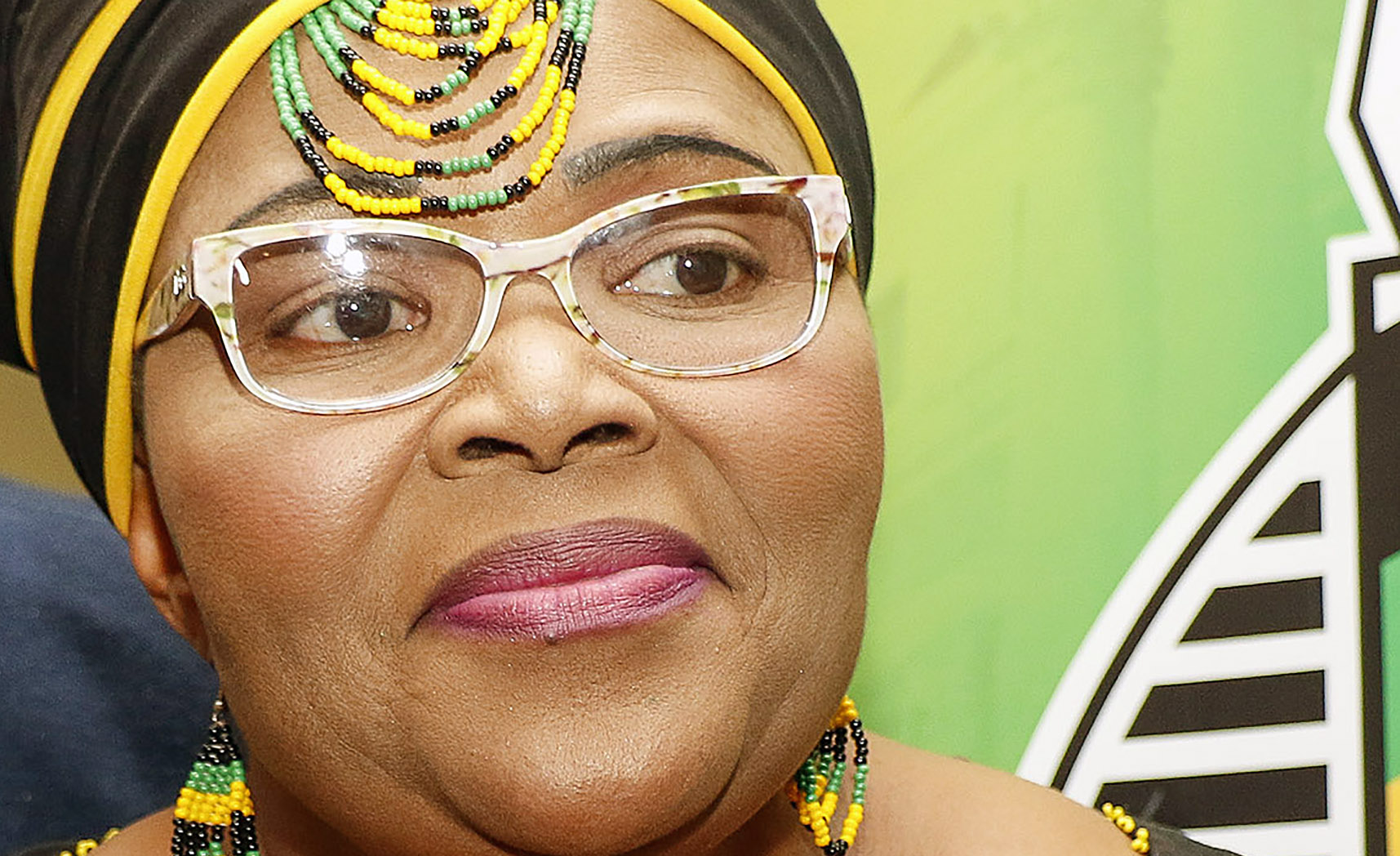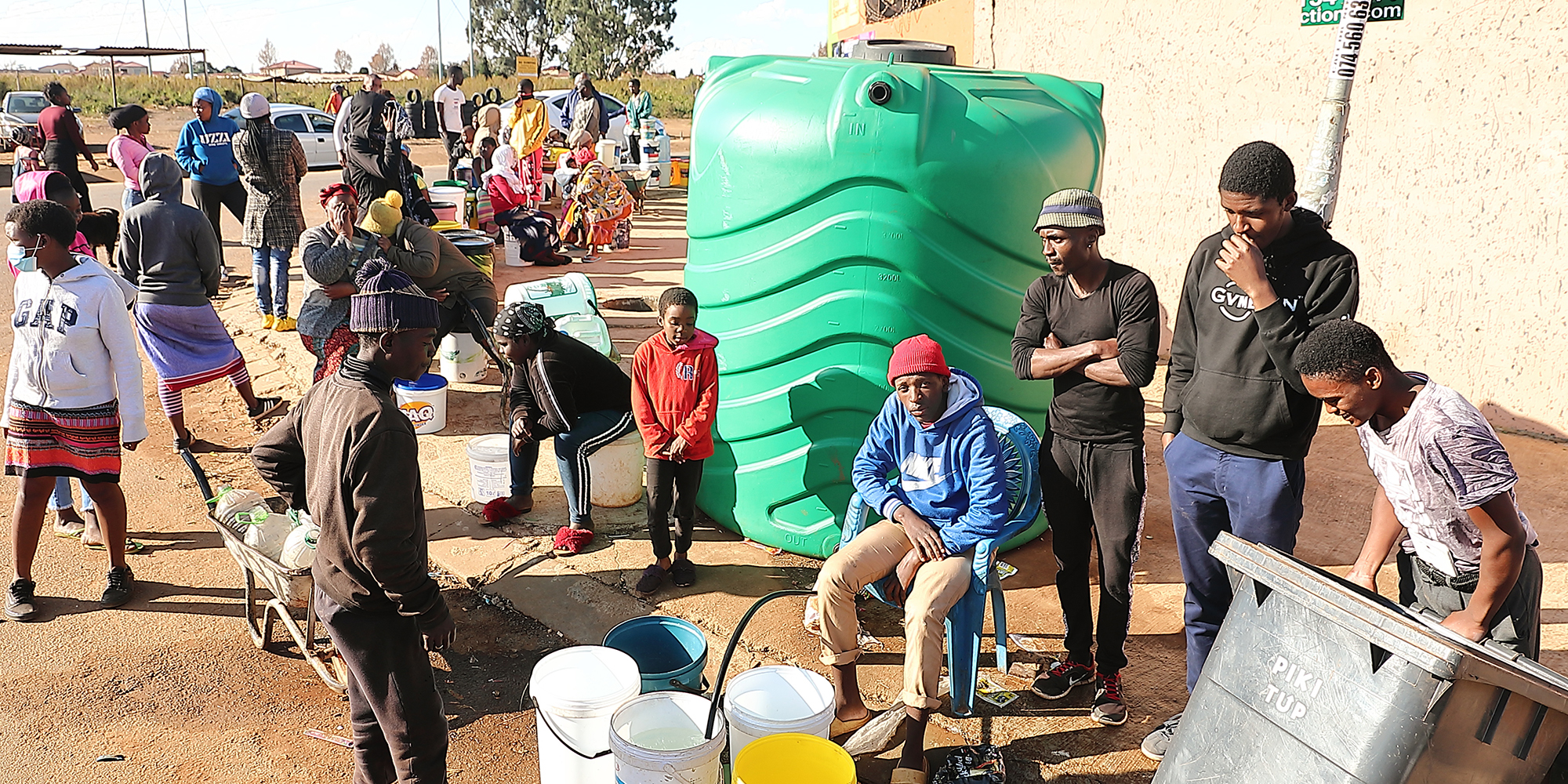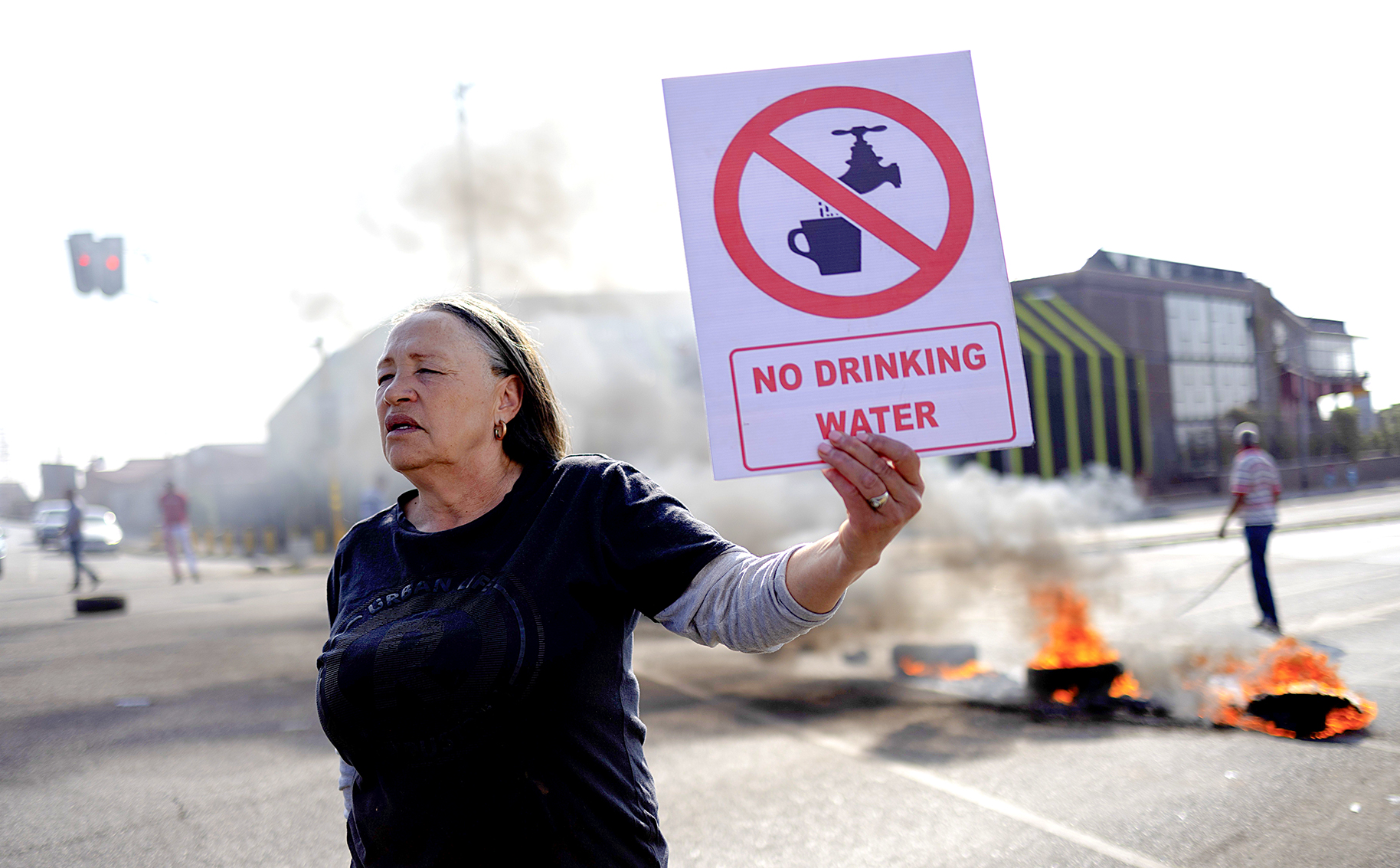On Tuesday night, Parliament’s water and sanitation committee met virtually to hear a briefing from Rand Water and the Department of Water and Sanitation (DWS) regarding their interventions to the water challenges faced by the residents of Gauteng.
As Ferial Haffajee reported for Daily Maverick on Tuesday, 23 October 2024, the province is in a water crisis with the three major metros – Johannesburg, Tshwane and Ekurhuleni – all under strain as summer arrives.
 Water and Sanitation Minister Pemmy Majodina. (Photo: Gallo Images / Adrian de Kock)
Water and Sanitation Minister Pemmy Majodina. (Photo: Gallo Images / Adrian de Kock)
Minister of Water and Sanitation Pemmy Majodina opened the session, highlighting that – as already mentioned in the department’s policy speech and budget speech – two critical provinces that have water problems; KwaZulu-Natal (specific to eThekwini) and the entire province of Gauteng.
She noted that Gauteng’s per capita water demand was, on average, 279 litres a person a day, compared with the international average of 173 litres.
“We said that is abnormal and something must be done,” she said.
While Majodina acknowledged Gauteng’s growing population and economy were factors, she highlighted the increase in non-revenue water in the municipal systems, saying, “That includes illegal connections, unbilled connections as well as physical losses such as leaks from municipal water distribution systems.
The 2023 No Drop Report noted that one of the main reasons consumption was so relatively high was due to physical losses in municipal distribution systems, which were affected by poor operation and maintenance of infrastructure.
The report also found that 47%, or 2.1 billion cubic metres per annum, of the total volume of water treated for municipal use is expected to be non-revenue water (26% being leaks and pipe bursts). The international average for non-revenue water is 30%.
“So the past two weeks, Gauteng has been in the news,” acknowledged Majodina.
“Planners in the DWS anticipated this growth as early as in the 1980s, hence the issue about getting water from the Lesotho Highlands, because we anticipated that there would be economic and population growth.”
She noted that it was unfortunate that phase two of the Lesotho Highlands Water Project was delayed for nine years, but said that major contracts were awarded in 2022, and construction is under way.
Read more: Water crisis — Johannesburg skirts Day Zero for fourth time in a year
‘Rand Water is extracting enough water to give to Gauteng’
“Rand Water is currently abstracting the maximum amount from the Vaal River System that is allowed,” said Majodina.
The DWS sets the limit on the amount of water Rand Water can extract from the Integrated Vaal Water System, and Majodina explained that it will only be possible for Rand Water to abstract more water from the system to supply water to municipalities of Gauteng once phase two of the Lesotho Highlands project is completed.
But Majodina emphasised that Rand Water is currently abstracting more than enough to supply Gauteng.
Sipho Mosai, group chief executive of Rand Water, explained during the committee briefing that Rand Water’s current water licence is authorised for 1,347 million cubic metres a year, but Rand Water is over-abstracting at 1,800 million cubic metres per annum (it received a temporary licence to abstract this level from the DWS).
“But in that licence, it’s very clear that the department wants us to come to a figure of 1,600 million cubic metres per annum by September next year,” said Mosai.
“In other words, if anything, we should be talking about reduction of the water that we’re already abstracting from the Vaal Dam.”
Short-term interventions for municipalities
“Gauteng is really not affected by drought,” said Majodina. “The Gauteng situation is out of self-inflicted pain by municipalities who don’t want to cooperate.”
 Residents queue for water in Swazi Township, Daveyton, Gauteng, on 30 July 2024. (Photo: Gallo Images / OJ Koloti)
Residents queue for water in Swazi Township, Daveyton, Gauteng, on 30 July 2024. (Photo: Gallo Images / OJ Koloti)
She told the portfolio committee that she had met all Gauteng municipalities, the Gauteng premier, and the Department of Cooperative Governance and Traditional Affairs (Cogta) to warn that the province would soon face a critical water shortage.
The only immediate solution was to implement level one water restrictions to compel all municipalities to take action. These restrictions were introduced on 18 September to reduce consumption and ease pressure on the system. Level one restrictions prohibit the use of hosepipes to water gardens, wash cars, clean driveways and fill up swimming pools and water features between 06:00 and 18:00.
Mosai noted that most of the Rand Water’s supply goes to three metros – Johannesburg, Ekurhuleni and Tshwane – and so the short-term interventions would then be water conservation and demand management in measures in the metros.
During a meeting with Gauteng municipalities on 14 October, the department proposed four immediate actions, which Majodina highlighted were all “doable”:
- Close the leaks with immediate effect. Majodina said, “It can be done within 72 hours.”
- Disconnect illegal connections.
- Municipalities need to collect revenue from all customers.
- Gauteng should focus on reservoirs so that they pump enough water.
Water management expert Professor Anja du Plessis from Unisa agreed that the first two actions – fixing leaks and addressing illegal connections – were achievable, but stressed that the necessary infrastructure repairs would require funding.
Du Plessis highlighted that municipalities had to tackle issues of non-payment and water theft to raise the revenue needed for essential maintenance. In Johannesburg, for example, about 50% of the city’s reservoirs were leaking, leading to water loss, low pressure, and supply disruptions, particularly in high-lying areas.
Ultimately, Du Plessis noted that while Rand Water, as the bulk supplier, was doing what it could, the municipalities had to urgently address their non-revenue water losses. She also pointed to the existing trust deficit between consumers and local governments, emphasising that consumers themselves needed to focus on water conservation and efficiency.
“Municipalities must deal with non-payment and theft to have the necessary funds to fix leaks, pipe bursts, and leaking reservoirs,” Du Plessis told Daily Maverick. She added that while the crisis was multifaceted and wouldn’t be solved overnight, addressing non-revenue water losses and reducing demand would yield quicker results and help alleviate pressure on the system.
Read more: Coronationville residents take to the streets, fed up by persistent Johannesburg water outages
Anthony Turton, a water resource management specialist at the University of Free State, agreed, telling Daily Maverick, “The simple reality is that Rand Water is supplying as much as it can, and the three major metros are demanding more than Rand Water is able to supply – so there is a significant imbalance between demand and supply.”
“Everyone is kind of looking at Rand Water to do something about it, but Rand Water is unable to do anything about it. And the three metros are obliged to reduce their consumption, and they seem to be collectively at their wit’s end as to how this should be done.”
Working with municipalities
Rand Water board chairperson Ramateu Monyokolo emphasised that it had actively engaged with Gauteng municipalities, noting that in the past two weeks, they had met with all municipalities and held about 46 meetings – excluding the meetings with Emfuleni, with which they met weekly as they worked towards launching the Municipal Viability Project.
Key issues raised include the lack of pumping capacity and inadequate storage infrastructure in municipalities, increasing non-revenue water (due to leaks and theft), and delayed payments to Rand Water. Monyokolo emphasised that almost 50% of water was lost through leaks or theft, contributing to the high demand that was straining the system.
Minister Majodina echoed his sentiments, asserting, “Gauteng can change the situation, if there is a political and management will to do so.”
“Rand water is doing what is expected to be done.”
 Finetown residents in Gauteng wait to fetch water from tankers. (Photo: Gallo Images / Fani Mahuntsi)
Finetown residents in Gauteng wait to fetch water from tankers. (Photo: Gallo Images / Fani Mahuntsi)
She also mentioned that some municipalities were now settling their invoices, allowing Rand Water to waive accrued interest.
“We have warned Gauteng about the risks of non-revenue water leading to shortages,” she said. “The premier and the MMC for Cogta are on board, and all mayors and municipal managers have committed to turning things around.”
“That’s how involved we are,” said Monyokolo. “We are not sitting and pointing fingers at municipalities. We go beyond our responsibility as a bulk water service provider and engage municipalities.”
Rand Water’s risks and goals
Monyokolo outlined Rand Water’s key risks for the 2024/25 financial year, including unreliable electricity supply, delays in infrastructure projects and escalating municipal debt. He noted that the utility had often been hit by power interruptions, which affected supply to areas like Johannesburg West.
“We usually don’t get affected by load shedding, but what impacts our operations is intermittent power supply,” he said, mentioning the Eikenhof Pump Station, which has been known to have power issues that have knock-on effects on the Commando System that affect power supply in Joburg West.
In response, Rand Water has committed to pursuing alternative water and power sources to reduce its dependence on Lesotho and mitigate the risk of outages. The utility is also resuscitating its “Rand Water Services” division to explore alternative revenue streams.
Another risk is the deterioration of the financial health of Rand Water, with Monyokolo explaining that “because of non-revenue water in Gauteng which stands at 49%, and that superfluous demand, and failure to pay debt, now at R7.8-billion, the expected credit loss by the end of our financial year in June was R2.5-million.”
A collective responsibility
“Effort needs to come from all sides, and the blame game should be stopped,” said Du Plessis.
She emphasised that responsibility lay with both those managing the water infrastructure and those who consumed it, calling for increased investment in infrastructure and better management practices while also stressing the need for increased accountability and responsible water usage.
“The reality that we all need to acknowledge and face is that we are facing a tipping point and need to have coordinated, realistic, and transparent discussions regarding the immense number of water challenges and problems in the region,” she said.
“Those responsible need to be more accountable, and those who have water need to use it more sparingly to ultimately try to ensure that everyone has water.
“All must fully acknowledge the reality of Gauteng’s water woes, as it will become exacerbated by below-average rainfall or drought and this cannot be solved overnight.” DM




 Finetown residents in Gauteng wait to fetch water from tankers. (Photo: Gallo Images / Fani Mahuntsi)
Finetown residents in Gauteng wait to fetch water from tankers. (Photo: Gallo Images / Fani Mahuntsi) 